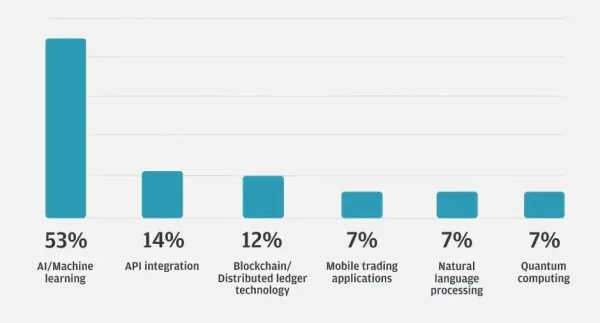According to a recent survey conducted by JPMorgan, only 14% of institutional traders are either continuing to trade in digital assets or have plans to do so in 2023. 835 traders from 6 global locations were surveyed by JPMorgan’s 7th edition of the e-Trading Edit.
The survey wanted to calculate the macroeconomic factors that could impact the trading markets. For instance, geopolitical conflicts and most likely, a recession could sway the trading waters.
Technical developments like Artificial Intelligence and Machine Learning projects that are gaining a stronghold over the consumer market recently, also seemed to form an integral part of the survey. With 53% of respondents saying AI/ML would shape the future of trading, other responses also included API integration, NLP models and blockchain technology to take over the markets completely in the future.
The survey results revealed a sense of hesitancy among traders when it comes to digital assets. These figures are in complete disagreement with the results of the same survey conducted in 2022, where blockchain technology and AI each received 25% of the votes.
The majority of the institutional traders surveyed by JPMorgan, 72%, indicated that they have “no plans to trade crypto/digital coins” in 2023. This is largely because 92% of the traders surveyed stated that they did not have any exposure to the digital asset market in their investment portfolio at the time of the survey.
This could be due to the volatile nature of the market, which was cited by nearly half of the respondents as the biggest challenge in their day-to-day performance.
The quantitative measures imposed by the Federal Reserve in 2022 in order to restrict daily trading may have also played a role, with 22% of respondents indicating that liquidity availability concerns were the most significant factor that continues to hinder their performance.
The disastrous collapses of Terra (LUNA) and trading platform FTX in 2022 were followed by this survey and the results were obviously impacted by the crypto market seeing a dip in investor and trader sentiment due to said crashes.

In another survey by JPMorgan, 30% of the respondents cited recession risk as the most significant macroeconomic factor to watch out for, while 26% believed inflation would have the most impact on trading outcomes.
It’s important to note that while trading refers to jumping in and out of stocks or assets for short-term profits, investors typically have a longer-term outlook.
Last year, a survey sponsored by crypto exchange Coinbase found that 62% of institutional investors had invested in the digital asset market from November 2021 to late 2022, despite the prolonged crypto winter.
In June of the same year, a study found that 71% of high-net-worth individuals had already invested in cryptocurrencies, with many adopting longer-term strategies instead of day-to-day trading.
In conclusion, the JPMorgan survey suggests that the majority of institutional traders are not yet ready to invest in digital assets, largely due to the volatile nature of the market and concerns over liquidity availability.
While the results of the survey differ from those of other surveys conducted in recent years, it’s clear that the crypto market continues to evolve and that the outlook for digital assets remains uncertain.
However, it’s worth noting that the 14% of traders who are either continuing to trade or planning to trade in digital assets in 2023, as well as the 14% who may do so within the next five years, suggests that the crypto market still holds some potential for growth and development.





